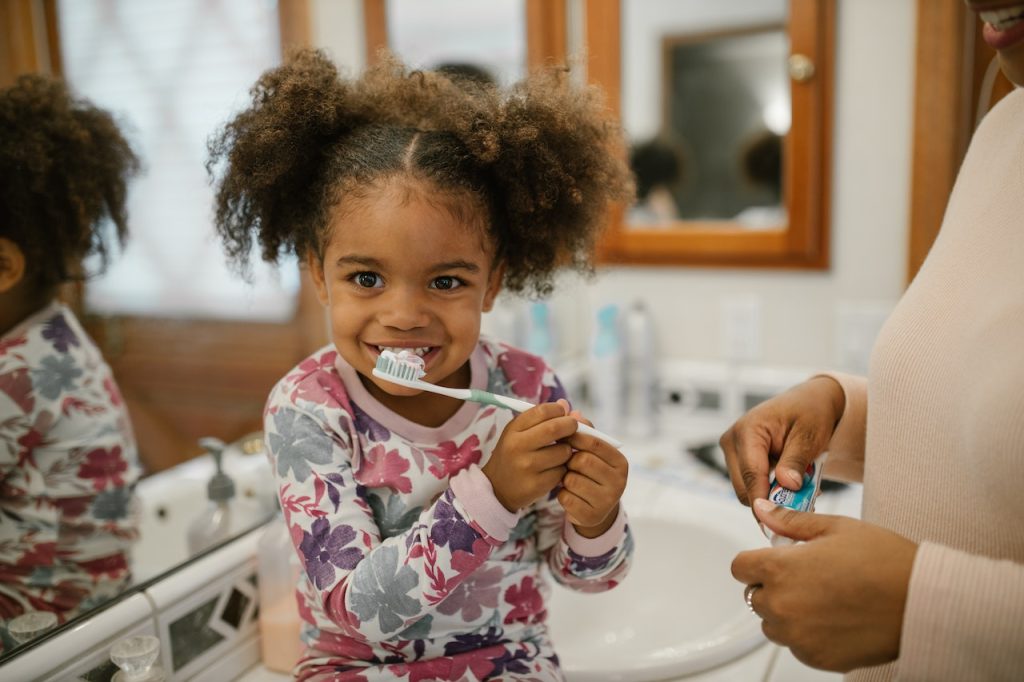Did you know that tooth decay is one of the most common chronic childhood diseases in the United States? It’s true! And unfortunately, it can lead to a whole host of other health issues if left untreated. Luckily, the government is playing an active role in improving children’s oral health through various public health initiatives.
National Children’s Dental Health Month is celebrated in Washington every February. Thousands of professionals, health care providers, and educators join forces to spread awareness of how beneficial excellent oral hygiene is for children. It reminds us that taking proper care of our teeth should always be a priority. The theme for 2023 was “Brush. Floss. Smile.”
So, if you have little ones that need extra encouragement with their dental hygiene, here are some tips to help them have a healthy smile:
Visit Dentists Regularly
Teething? It’s time for your first dental visit – congratulations! cue confetti
We know it can be an emotional rollercoaster. You’re worried about how your little one will handle it all. Will your child cry? Will they be scared? Will they wiggle and squirm the whole time?
But fear not! With the help of a pediatric dentist, your kids will do just fine. They’re experts at soothing little ones during their teething phase and ensuring they feel comfortable and safe during their visit. Plus, they can give you all the inside tips on brushing your child’s teeth. They’ll also suggest special toothpaste for kids.
And the best part? Regular checkups with a pediatric dentist can help your child establish a great relationship with their dentist from an early age. That means future dental visits will be a breeze!
Also, you can get the best dental treatment for kids in Washington at the earliest if your child has any oral health disease and it’s diagnosed at the right time.
Develop the Habit of Brushing Teeth in the Initial Years
“Brushing teeth? What are you talking about? He’s not even one yet!”
You may be surprised to hear that it’s never too early to start caring for your baby’s teeth. Experts suggest that you start right from the time of birth. It can prevent or reduce cavities in young children. Plus, the earlier you build a good oral hygiene routine, the more likely your child will maintain it for life.
It begins with easy, quick steps like cleaning their gums after every feeding session. You can use a soft and damp cloth to wipe them down. Once their teeth start popping, you can switch to a baby-safe toothbrush.
If your baby has a habit of sleeping with their bottle in the mouth, it has to go. Sugary liquids like milk, juice, or other sweet drinks can cause decay in their little teeth if it remains on them for too long. So, only let them feed “at will.”
Also, please know that tooth decay is transmissible. So, if you habitually test your child’s bottle’s temperature by putting it in your mouth, you can pass on the bacteria to them.
Teach Proper Brushing Techniques
Kids want to be fast at everything. So, they’ll brush their teeth at lightning speed to get over it. But this is a surefire way of missing spots and leaving plaque behind.
Your little genius must learn how to brush their pearly whites right. Guess who’s responsible for that? You.
Show them how it’s done. Demonstrate a proper brushing technique and let them practice it with your help. The gentle up-and-down motion that reaches the gum line is right.
You must also encourage them to use short strokes. It’ll help them clean every crevice and nook of their teeth. And make sure to remind them that they must brush their tongue too. Come up with a creative story of how an army of bacteria has invaded their mouth, and it’s their job to brush them away.
And remember to mention that they must brush twice daily for two minutes each time.
Let Them Choose Their Toothpaste
There’s nothing like a little pampering to encourage your kiddo to brush their teeth. So, let them choose their toothpaste.
It can be anything from fruity flavors to fun cartoons on the packaging. You’re good to go as long as it has the ADA seal.
But make sure that your child knows not to swallow their toothpaste. It can make them sick. Teach them how to spit it out in the sink.
Generally, fluoride toothpaste is ideal for young children. It can help protect their teeth from cavities and strengthen them. And they’ll only need a pea-sized amount each time.
Flossing Should Be Fun
Let’s face it; flossing doesn’t come naturally to children immediately. But removing plaque and food particles from the tiny, tight spaces between their teeth that a toothbrush can’t reach is essential.
So, get creative and find ways to make it fun. You could use flavored floss or encourage them to make silly stories about their adventures flossing up the bacteria. You can also make it interactive by adding a sticker chart so they can keep track of their flossing routine. You’ll be surprised how responsible and proud they’ll feel.
But when’s the right time to start flossing? Let’s say as soon as two teeth start touching each other, it’s time to floss.
Diet Matters Too
It’s easy to spoil your little one with sugary snacks and drinks. Just look at those cute faces secretly hoping for a piece of chocolate. But these types of food are not good for their dental health.
Some foods specifically help with the development of strong teeth too. For example, cheese and other dairy products contain calcium that helps form tooth enamel. So, introduce finger foods like string cheese and yogurt they’ll love! So, keep sugary treats and drinks to a minimum and give them more healthy snacks like fresh fruits, vegetables, and dairy products.
These healthy diet tips will also help keep your child’s weight in check, as extra pounds can lead to other oral health issues like TMJ or temporomandibular joint disorder responsible for jaw pain and sleep apnea.
Final Thoughts
It’s never too early to start teaching your children the importance of oral health. Building good habits from an early age will make it more likely for them to keep up with their dental hygiene routine. So, find creative and fun ways to engage your kids in maintaining oral hygiene.
Always ensure you take your little one for regular checkups to the dentist. It’ll also help them establish a relationship with their dentist that won’t make them feel anxious or scared in the future. Good luck, parents!



